Chenxi Song
WorldForge: Unlocking Emergent 3D/4D Generation in Video Diffusion Model via Training-Free Guidance
Sep 18, 2025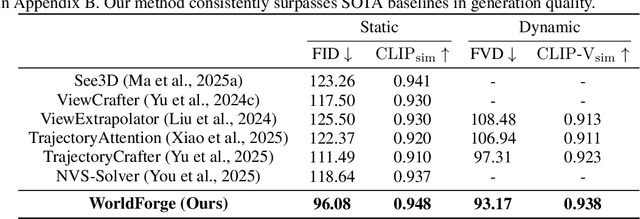
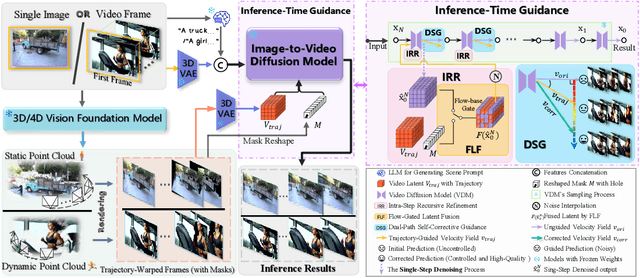
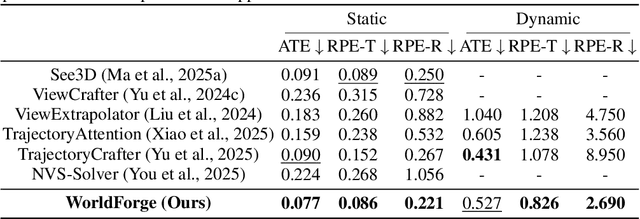
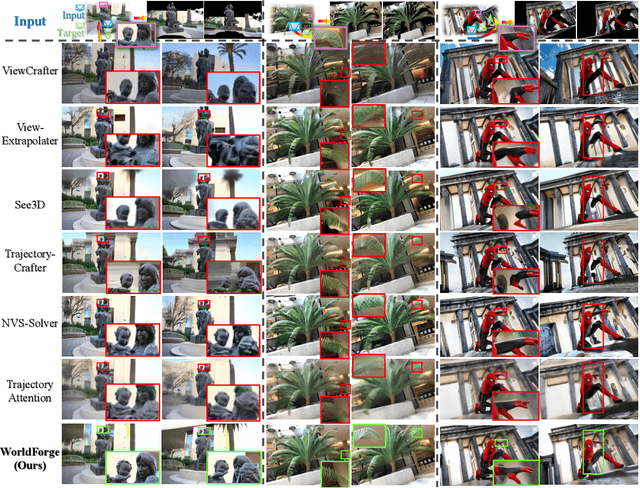
Abstract:Recent video diffusion models demonstrate strong potential in spatial intelligence tasks due to their rich latent world priors. However, this potential is hindered by their limited controllability and geometric inconsistency, creating a gap between their strong priors and their practical use in 3D/4D tasks. As a result, current approaches often rely on retraining or fine-tuning, which risks degrading pretrained knowledge and incurs high computational costs. To address this, we propose WorldForge, a training-free, inference-time framework composed of three tightly coupled modules. Intra-Step Recursive Refinement introduces a recursive refinement mechanism during inference, which repeatedly optimizes network predictions within each denoising step to enable precise trajectory injection. Flow-Gated Latent Fusion leverages optical flow similarity to decouple motion from appearance in the latent space and selectively inject trajectory guidance into motion-related channels. Dual-Path Self-Corrective Guidance compares guided and unguided denoising paths to adaptively correct trajectory drift caused by noisy or misaligned structural signals. Together, these components inject fine-grained, trajectory-aligned guidance without training, achieving both accurate motion control and photorealistic content generation. Extensive experiments across diverse benchmarks validate our method's superiority in realism, trajectory consistency, and visual fidelity. This work introduces a novel plug-and-play paradigm for controllable video synthesis, offering a new perspective on leveraging generative priors for spatial intelligence.
FlowDirector: Training-Free Flow Steering for Precise Text-to-Video Editing
Jun 05, 2025Abstract:Text-driven video editing aims to modify video content according to natural language instructions. While recent training-free approaches have made progress by leveraging pre-trained diffusion models, they typically rely on inversion-based techniques that map input videos into the latent space, which often leads to temporal inconsistencies and degraded structural fidelity. To address this, we propose FlowDirector, a novel inversion-free video editing framework. Our framework models the editing process as a direct evolution in data space, guiding the video via an Ordinary Differential Equation (ODE) to smoothly transition along its inherent spatiotemporal manifold, thereby preserving temporal coherence and structural details. To achieve localized and controllable edits, we introduce an attention-guided masking mechanism that modulates the ODE velocity field, preserving non-target regions both spatially and temporally. Furthermore, to address incomplete edits and enhance semantic alignment with editing instructions, we present a guidance-enhanced editing strategy inspired by Classifier-Free Guidance, which leverages differential signals between multiple candidate flows to steer the editing trajectory toward stronger semantic alignment without compromising structural consistency. Extensive experiments across benchmarks demonstrate that FlowDirector achieves state-of-the-art performance in instruction adherence, temporal consistency, and background preservation, establishing a new paradigm for efficient and coherent video editing without inversion.
AppAgentX: Evolving GUI Agents as Proficient Smartphone Users
Mar 04, 2025



Abstract:Recent advancements in Large Language Models (LLMs) have led to the development of intelligent LLM-based agents capable of interacting with graphical user interfaces (GUIs). These agents demonstrate strong reasoning and adaptability, enabling them to perform complex tasks that traditionally required predefined rules. However, the reliance on step-by-step reasoning in LLM-based agents often results in inefficiencies, particularly for routine tasks. In contrast, traditional rule-based systems excel in efficiency but lack the intelligence and flexibility to adapt to novel scenarios. To address this challenge, we propose a novel evolutionary framework for GUI agents that enhances operational efficiency while retaining intelligence and flexibility. Our approach incorporates a memory mechanism that records the agent's task execution history. By analyzing this history, the agent identifies repetitive action sequences and evolves high-level actions that act as shortcuts, replacing these low-level operations and improving efficiency. This allows the agent to focus on tasks requiring more complex reasoning, while simplifying routine actions. Experimental results on multiple benchmark tasks demonstrate that our approach significantly outperforms existing methods in both efficiency and accuracy. The code will be open-sourced to support further research.
Transfer Learning with Clinical Concept Embeddings from Large Language Models
Sep 20, 2024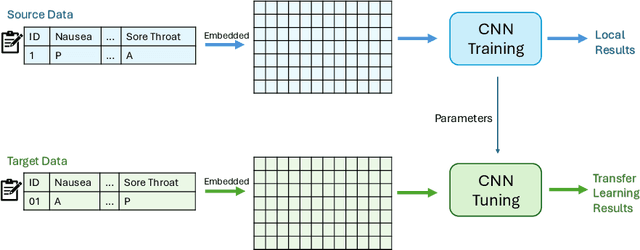

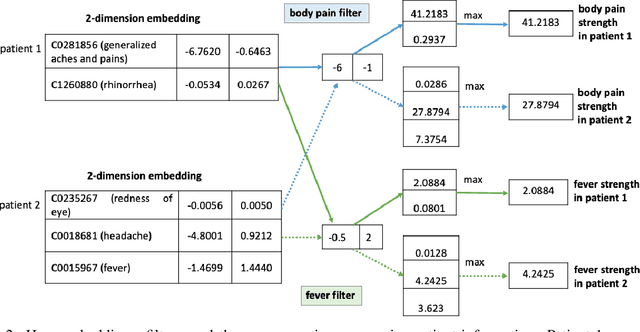

Abstract:Knowledge sharing is crucial in healthcare, especially when leveraging data from multiple clinical sites to address data scarcity, reduce costs, and enable timely interventions. Transfer learning can facilitate cross-site knowledge transfer, but a major challenge is heterogeneity in clinical concepts across different sites. Large Language Models (LLMs) show significant potential of capturing the semantic meaning of clinical concepts and reducing heterogeneity. This study analyzed electronic health records from two large healthcare systems to assess the impact of semantic embeddings from LLMs on local, shared, and transfer learning models. Results indicate that domain-specific LLMs, such as Med-BERT, consistently outperform in local and direct transfer scenarios, while generic models like OpenAI embeddings require fine-tuning for optimal performance. However, excessive tuning of models with biomedical embeddings may reduce effectiveness, emphasizing the need for balance. This study highlights the importance of domain-specific embeddings and careful model tuning for effective knowledge transfer in healthcare.
 Add to Chrome
Add to Chrome Add to Firefox
Add to Firefox Add to Edge
Add to Edge